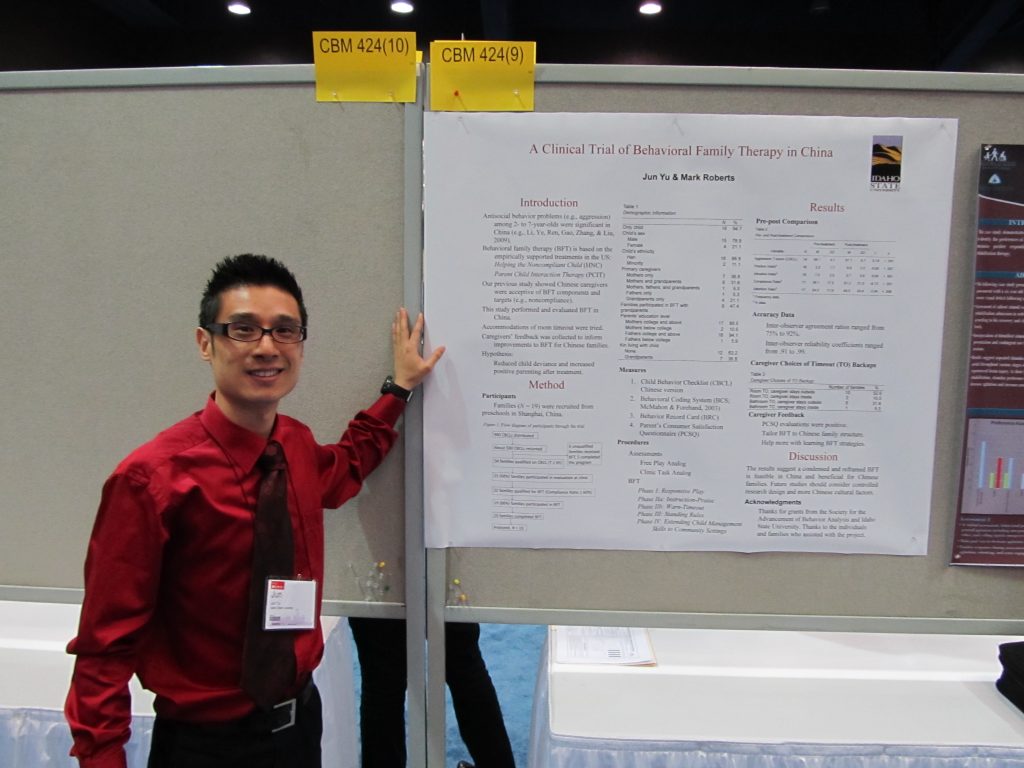As many of you know, My husband Jun Yu is fighting against injustice in higher education. ISU ruined his 5 yrs of education & future, and denied him the PhD he rightfully earned. Learn more and support his cause at Generosity.com. #JusticeForJun
—–
 People have been asking, where is the discrimination in Jun Yu’s case? The answer is, modern discrimination and racism usually lurk behind more obvious wrongdoing.
People have been asking, where is the discrimination in Jun Yu’s case? The answer is, modern discrimination and racism usually lurk behind more obvious wrongdoing.
While ISU committed acts of aversive racism against Jun (see aversive racism report), at the same time, they egregiously violated professional standards in how they dealt with Jun.
Why does it matter that ISU violated professional standards? The answer is, because universities cannot substantially deviate from accepted academic norms and professional standards are academic norms. (See Regents of University of Michigan v. Ewing, 106 S.Ct. 507, 513, 474 U.S. 214, 224-25 (U.S.Mich.,1985). See also Emerson v. North Idaho College, 2006 WL 3253585, at *8 (D.Idaho, 2006).)
Let’s look at how ISU blatantly violated professional standards in psychology.
One of the strongest aspects of Jun’s case is the fact that ISU blatantly violated the professional standards in psychology.
The Ethical Principles of Psychologists and Code of Conduct from the American Psychological Association (aka the APA Ethics Code) is a set of standards that every licensed psychologist in the US is bound to follow. Every psychology board in the US has adopted the APA Ethics Code as part of their laws that govern the work of every licensed psychologist. Furthermore, the ISU clinical psychology PhD program has been accredited by APA since 2001. Accreditation standards also demand that department faculty follow APA Ethics.
The APA Ethics Code includes a standard (7.06) about supervising students:
7.06 Assessing Student and Supervisee Performance
(a) In academic and supervisory relationships, psychologists establish a timely and specific process for providing feedback to students and supervisees. Information regarding the process is provided to the student at the beginning of supervision.
(b) Psychologists evaluate students and supervisees on the basis of their actual performance on relevant and established program requirements.
Ethics in Psychology and the Mental Health Professions by Dr. Gerald Koocher and Dr. Patricia Keith-Spiegel, one of the most popular textbooks for training psychology students in ethics, stated regarding 7.06:
When discussing serious criticisms with supervisees, one should invariably offer these in writing, followed or accompanied by a dialogue about expected changes with a remedial plan…. [Students are] certainly entitled to feedback and would be justified in asserting the inappropriateness of saying nothing about shortcomings until the final evaluation. Such behavior, if true, afforded [the student] no opportunity to attempt remediation of his defects and denied him due process.
Now, look at what happened to Jun at the hands of this supervisor as reported by the Idaho State Journal:
During Yu’s fourth year in the program, John Landers was his supervisor for the fall 2011 PSYC 7748 Clinical Externship class at the Eastern Idaho Regional Medical Center.
The externship was not a required course, but Yu was recommended by the CTC to the externship to gain experience “critical for students to compete for national internships,” according to the complaint.
According to the contract, the externship was planned to last for one year.
But just two months into the externship, Landers dismissed Yu from the externship, alleging that Yu was “unable to grasp the communication nuances.” This was despite Yu meeting the English proficiency standards for admission at the university.
Yu received no prior, specific feedback regarding alleged areas of concern or remediation. [Emphasis added] Landers wrote that “this site could not afford to engage in remediation efforts” and he acknowledged that “daily feedback may have been too indirect.”
I would also add to this that Jun received his first and only evaluation from this supervisor 10 days after the dismissal. Yes, that’s right. He was dismissed first, and then 10 days later the supervisor did the evaluation.
All of this — no prior, specific feedback regarding alleged areas of concern, no remediation, doing an evaluation 10 days after a dismissal — is apparently a flagrant violation of APA Ethics Code 7.06, as described by the authors of that ethics textbook.
And it wasn’t the only one. In fact, the ethics expert reported in his summary of opinions:
If the allegations made by the ISU faculty are to be believed, they clearly failed to perform appropriate timely assessments; provide timely feedback; propose and assist with necessary remediation; or provide timely monitoring of off-site placements….As previously noted, there were no written documentation of substantive guidance, remedial feedback, or corrective action. (Docket 22-1 p. 24 of 44.)
In other words, they didn’t ensure proper supervision in accordance with 7.06.
You’re probably now scratching your head and asking yourself, how in the world could ISU do this to Jun? How could they completely disregard ethics in how Jun was treated in a supervisory situation? It’s a question Jun and I have asked ourselves again and again.
And as noted above, that example with the externship supervisor is not only way ISU apparently violated 7.06, as this excerpt from the aversive racism report reminds us:
There are many ways in which Dr. Leslie Speer violated the minimal due process that was available to Mr. Yu (Plaintiff Document 000053-000059) – ranging from not offering a second assessment until after his dismissal to not working with him to develop a remediation plan in the face of performance concerns to not assembling the group of supervisors in Ohio to discuss his performance before dismissal – and the ISU faculty used the decision of Dr. Speer to justify dismissing Mr. Yu from the program. The ISU faculty’s decision to privilege the opinion and decision-making of a supervisor who was violating accepted standards means that the decision was, at least in part, based on a violation of accepted professional norms. (Docket 24-1 p. 28 of 33.)
So, once again you have a supervisor who 1) dismissed Jun first and then did an evaluation; and 2) didn’t do any remediation.
It’s no wonder, then, that Jun’s ethics expert concluded that ISU violated 7.06:
A number of ethical and accreditation standards have been violated in Mr. Yu’s case. These include ethical violations by faculty members related to following through with program descriptions (Code: 7.02), flaws in assessing and responding to student performance (Code: 7.06), and avoiding harm (Code: 3.04). (Docket 22-1 p. 23 of 44)
And so did Jun’s cultural competency expert:
Ethical violations by ISU faculty and clinical supervisors, as guided by the American Psychological Association’s Ethical Principles of Psychologists and Code of Conduct (American Psychological Association, 2010), include boundaries of competence in training international students who speak English as a second language (APA Ethics Code Standard: 2.01), avoiding harm (APA Ethics Code Standard: 3.04), and assessing student and supervisee performance (APA Ethics Code Standard: 7.06). (Docket 22-1 p. 34 of 44.)
It’s very disturbing that an APA Accredited Program would apparently violate the very standards they are supposed to model and train students in.
But more importantly, it shows a substantial departure from accepted academic norms. (See Regents of University of Michigan v. Ewing, 106 S.Ct. 507, 513, 474 U.S. 214, 224-25 (U.S.Mich.,1985). See also Emerson v. North Idaho College, 2006 WL 3253585, at *8 (D.Idaho, 2006).)
This is why you’ll find the following statements in the conclusions reached by Jun’s experts (emphasis added):
“Taken as a whole, the actions of the faculty at ISU in dismissing Mr. Yu as they did constitute, in my opinion, substantial arbitrary and capricious and departures from accepted academic norms in clinical psychology doctoral programs.” (Ethics expert, Docket 22-1, page 25)
“On the basis of these facts, it is my opinion that the behavior of the members of the Idaho State University psychology department was arbitrary and capricious and deviated from accepted professional norms in psychology.” (Aversive racism expert, Docket 22-1, page 31)
“In my opinion, the actions of the faculty at ISU in dismissing Mr. Yu as they did, was a substantial departure from accepted academic norms.” (Cultural competency expert, Docket 22-1, page 36)
So, how is all this discriminatory?
Look at it this way. ISU had an obligation and responsibility to adhere to APA Ethics in their treatment towards Jun — particularly as a clinical psychology program responsible for educating students in ethical and professional behavior. Yet, they flagrantly violated ethics, the most important professional standards for psychologists.
Anyone who knows APA Ethics would find the violations I mentioned above abhorrent, particularly for people in psychology (often referred to as “the helping profession”). This is a field that supposedly cares about safeguarding the rights of others. Yet, as Jun’s ethics expert wrote, “the program…did not adequately respect [Jun’s] rights.” (Docket 22-1 p. 24 of 44.)
It’s as if ISU believed, when it came to their behavior with Jun Yu, professional standards and ethics no longer apply.
Ask yourself, why would an APA-Accredited program so blatantly violate these standards? And why did the wrongdoing happen to the one student in the program who was Asian, from China, spoke English as a second language?
P.S.: Based on feedback in the comments, I’ve since edited the article to make things clearer to readers, particularly noting the importance of Regents of University of Michigan v. Ewing in Jun’s case.
My husband Jun Yu is fighting against injustice in higher education. ISU ruined his 5 yrs of education & future, and denied him the PhD he rightfully earned. Learn more and support his cause at Generosity.com. #JusticeForJun

